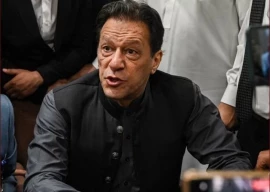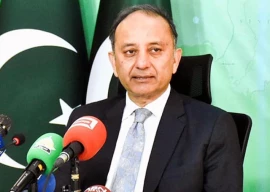
Outside in the street, four volunteers holding polio vaccines, a thermos flask and a spreadsheet, are, for a second, taken aback but unfazed.
They are part of teams tackling a door-to-door campaign to vaccinate the poorest of the poor children in Qayyumabad in three days. The effort is part of Rotaract that is working with the WHO, Unicef and the Pakistani government to eradicate polio from the country. The campaign began in Hyderabad as well on Monday, APP reports. The work will be done by 671 mobile health teams. As many as 288,577 children are being targeted.
Pakistan is one of the four countries that still have registered cases of polio. While the number of cases are down from 1,000 a year ten years ago to 29 cases, this is not good enough because even if one child has it, the disease can spread. “By identifying the right places, pooling resources, your community service becomes more beneficial,” says Nida Yousuf, a district Rotaract representative.
In Karachi, the volunteers are aged 16 to 25 and sponsored by various Rotary clubs across Karachi. They must go door to door in every alley of Qayyumabad, administer the oral polio vaccine to each child under the age of five years, and mark their little finger with a purple pen.
By 9 am on Monday, the volunteers from Nixor College, CAS, Karachi University, and IBA to name a few were ready. Dr Shahid of Sir Syed Hospital was in charge of training. His instructions were practical - the mixed population of Qayyumabad speak many languages, so it is best to stick to an understandable Urdu. He warns them that questions must be polite, non-aggressive and to the point ie How many kids under the age of 5? How many families in each house?
Few people refuse but the volunteers are told to expect this much. “One group was told ‘Aap gandey hain’,” Dr Shahid recalls. They slammed the door in their face.
The volunteers draw on their powers of persuasion. “Only when we said polio could paralyze their child did the mother allow the drops,” says volunteer Natasha Baig. “Otherwise she really didn’t have clue.” Men weren’t allowed in some houses: “You learn to be extremely tactful.”
Many residents were, however, quite friendly. Some invited the group in for tea or lunch. Some children run forward, excited at the prospect of getting some attention and others wail at the sight of a ‘doctor’. One man on a motorcycle spots the team and stops it. He gives them his address and asks for reassurance that they will indeed show up for “meri chotti si bachi”.
Neighbours pitch in, helping to open up reluctant doors when volunteer attempts fail. “There will always be rumours, always some resistance but it’s all about trust,” says Abdul Mohee. “They’re eager for help, and we want to help. So [the question is] can we create that comfort level?”
Misconceptions about the polio vaccine abound. Some people think it is a “foreign conspiracy” to sterilise the Muslim population. This is reminiscent of a 2007 incident in which the Taliban in Bajaur Agency issued fatwas that the government-run polio vaccination drive was a US plot to reduce the Muslim population. The parents of almost 24,000 children refused the vaccine.
Still, optimism is key. Dr Hussein, a town health officer of the region, has high hopes. “It’s easier when dealing with specific communities,” he says. “Trust develops quickly.”
For Dr Kamal the success rate has been better: “Polio cases were eradicated in Korangi by 2006,” he says proudly. “Even in the two cases reported before 2006, one of the children was Afghan [and he had picked up the virus from Afghanistan, not Pakistan].”
According to Dr Shahid, an effective media programme has also helped change attitudes. Mobile phone companies send out SMS alerts during each campaign and the police set up transit immunisation posts for children on the move. The president’s daughter, Aseefa Bhutto Zardari, also lends her ‘celebrity’ to the cause as Pakistan’s Polio Ambassador. Every little bit counts but for now, much of the success of the campaign depends on these ‘street ambassadors’ over the next two days.
reporting by MEIRYUM ALI
Published in The Express Tribune, July 13th, 2010.
1732521023-0/biden-(1)1732521023-0-405x300.webp)
1732520496-0/BeFunky-collage-(86)1732520496-0-165x106.webp)
1732519472-0/lamar-(3)1732519472-0-165x106.webp)
1732519298-0/BeFunky-collage-(85)1732519298-0-165x106.webp)




1732513395-0/Copy-of-Untitled-(75)1732513395-0-270x192.webp)








COMMENTS (2)
Comments are moderated and generally will be posted if they are on-topic and not abusive.
For more information, please see our Comments FAQ